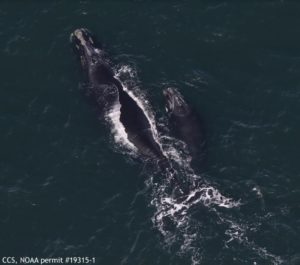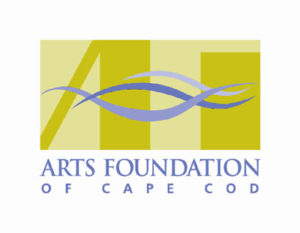
The approximately two month old calf of right whale ‘Harmonia’ playing alongside a channel marker in Cape Cod Bay.
Credit: Center for Coastal Studies, NOAA permit #19315-1
PROVINCETOWN – Researchers from the Center for Coastal Studies Right Whale Ecology Program documented two North Atlantic right whale mother/calf pairs in Cape Cod Bay last week.
That brings the total number of calves seen in the Bay this spring to three.
The first pair was photographed off Race Point on April 12 by local naturalist and major data contributor Peter Flood.
The mom was identified by researchers as a well-known individual named Calvin, who was first seen with her new calf on February 3 off the coast of Georgia.
On April 14, the aerial survey crew sighted a second mom/calf pair about 1.5 nautical miles north of Mayflower beach in Dennis.
The mother, identified as Palmetto, was initially spotted with her calf in early February off South Carolina.
This is Palmetto’s fifth documented calf, and the only one she is known to have brought into Cape Cod Bay.
Later in the day, the flight team photographed a right whale named Harmonia and her calf about one nautical mile east of Manomet.
In August 2019, a fecal sample was collected from Harmonia in the Gulf of St. Lawrence by the New England Aquarium team; subsequent analysis indicated she was pregnant and it was confirmed in January when she was seen with her calf off Georgia.
This is Harmonia’s third known calf and the only one that she has been documented with in Cape Cod Bay.
“To our knowledge, this is the first time that either of these two new moms have brought their calves into Cape Cod Bay,” noted Dr. Charles “Stormy” Mayo, Director of the Right Whale Ecology Program.
“At this point in time we don’t know what specifically drew them here this year, although good feeding conditions is likely part of the story and the results of our right whale habitat monitoring work may offer up some clues.”
There were only ten known North Atlantic right whale calves born this season.
One of those was just a few days old when it was struck by a vessel and suffered likely-lethal wounds to its head and jaw.
Neither the injured calf, nor its mother, have been seen since late January.
“It’s a long and perilous journey from the right whale calving grounds off Florida and Georgia to Cape Cod Bay, so it’s always a relief to see the mothers and their offspring arrive unscathed,” said Dr. Mayo.
“With only 400 of these animals left in the world, it’s up to us to do everything we can to protect them while they’re in our waters, even during these incredibly difficult times.”
In an earlier statement, CCS President and CEO, Rich Delaney, emphasized that, while the Center is making every effort to maintain their essential research and rescue programs during the COVID-19 crisis, the health and wellbeing of staff, their families and the public remains his top priority.
The Center has implemented mandatory safety procedures for scientists and crew working in the lab, on research vessels and in the plane, and have provided those individuals with the necessary Personal Protective Equipment.
Boaters, kayakers, paddle-boarders, swimmers and light aircraft and drone pilots are reminded that it is illegal to approach a North Atlantic right within 500 yards (1500 feet) without a Federal Research Permit.
However, the whales often feed very close to shore, offering watchers on the beach unbeatable views of one of the rarest of the marine mammals.
For additional information about the Center for Coastal Studies Right Whale Ecology program, click here.
























